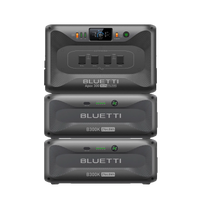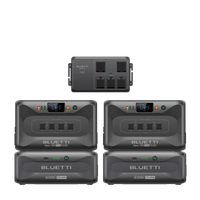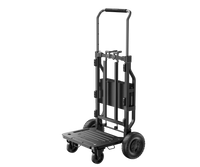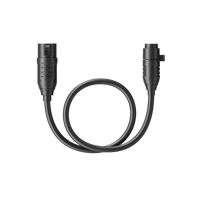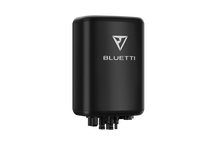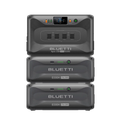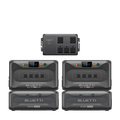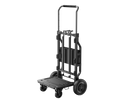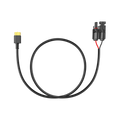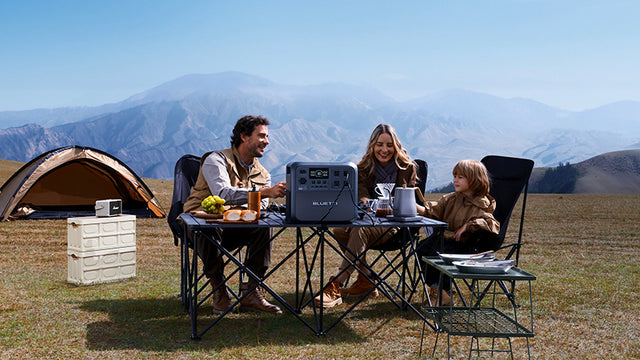Your cart is empty
Shop our productsCamping is an adventurous way to take a break from the hectic life that is everyday. And you want to relax while keeping in contact with your friends and enjoying activities you would do at home such as watching movies. For this, you’d need a power source. This is where a generator comes into play. But what size fits your energy requirements? Let’s find out.
Types of RV Generators
You can use different types of generators in a camper. They can vary depending on their portability and fuel types. Here are the most common types:
Solar Generators

As the name suggests, it is a generator that powers your RV appliances using solar energy. It is a combination of solar panels, a charge controller, batteries, and an inverter. Solar generators are an ideal option for campers who want to reduce their reliance on fossil fuel. Likewise, they are an excellent option if the camp site has plenty of sunshine.
That said, solar generators may not power the whole RV since their power output is dependent on sunlight availability. Besides, they have lower power output than onboard and gas generators.
Dual Fuel Generators
This type of RV generator can run on more than one fuel type. Most will run on gasoline and propane or diesel. Whichever the case, they provide much-needed flexibility since you don’t rely on one source of fuel. If you run low on gasoline, you can seamlessly substitute it with propane or natural gas.
Dual fuel generators are also ideal for energy intensive RV appliances. The downside? They produce toxic gasses, hence should be placed a few meters from your camper. They are also notoriously noisy.
Onboard Generators
These are built-in generators, which come pre-installed in large campers. They are specifically designed to produce power that can run all and extra appliances in your RV.
They run off your RV’s fuel supply and can produce high power output. They can even be used to charge portable camping batteries and backup systems. Like dual fuel generators, they can be quite noisy.
Portable Generators
Portable generators are units that a camper can bring along and use for just about any needs. They can be used to power large appliances or charge small devices such as laptops. They are compact and lightweight allowing you to move them around.
While they offer flexibility, they do not produce as much power as onboard, solar,and dual fuel generators. They are however an ideal backup option if you run out of fuel. Besides, you can charge them using other existing generators.
BLUETTI has high-quality and efficient portable generators ideal for camping. Here are two you can use in your next camping trip.
BLUETTI AC180 Solar Portable Power Station

This portable yet high-efficient workhorse has a maximum capacity of 1,800W. Compact in design, it is lightweight allowing you to move around with it. Furthermore, it can fit in small spaces so you don’t need too much floor space to use it. And thanks to the 2,700W power output, you can run your high-energy appliances. It also comes with many outlets ranging from AC, USB-A, and USB-C.
This means you can connect your laptop, smartphone, or gaming console. And if you want to use it for lighting only, you can rest assured it will last up to 93 hours. The best part is that you can use a generator, solar panels, or your camper to recharge it.
BLUETTI AC200L Portable Power Station

Another portable option is the AC200L with a 2,048Wh capacity. It enables you to connect and use small appliances simultaneously. The 3,600W Power Lifting Mode is adequate to run larger appliances such as refrigerators and the AC. You can however expand its capacity to 4,096Wh or 8,192Wh depending on your energy demands.
One feature that stands out is its fast charging capability. It charges from 0 to 80% within 45 minutes. And you can use it as you recharge so you don’t have to worry about any downtime. With 6 ways to recharge it, you can never run out of power to keep your devices on. As you’d expect, it is quieter than the built-in and dual fuel generators.
How Big of a Generator Do I Need for a Camper?
When choosing the right camper generator size, you don’t have to always go for bigger options. They are often unnecessary. Aim for a generator that can run all your appliances and charge your peripheral devices without overloading. In short, opt for a generator with a slightly higher capacity than your energy needs. 20% more is a good start.
Three factors determine the size of the generator you need: watts, amps, volts.
A watt, which is a power unit, will help you determine the size of generator you need. The more the watts the larger the generator you’ll need.
A volt is a measure of how much electrical current can flow in a wire. In this case, how much electrical current your RV can handle. Most RVs have a 120V rating. Quite adequate for everyday use.
Amps indicate how much current a device can handle at a specific time. Most RVs have a 30 amps or 50 amps rating. It ensures they can handle most of the built-in and additional electrical devices.
So, to determine how big your RV generator should be, you can use the following formula:
Volts (V) x Amps (A) = Watts (W)
If you are using a 30-amp RV, you’ll need a generator that can provide at least 3600W.
120V x 30A = 3600W
Most BLUETTI generators can afford this power output without a hassle.
For a 50-amp Rv, you’ll need 6000W for each volt wire. So, you’ll need a generator with a 12,000W capacity
(120V x 50A) + (120V x 50A) = 12,000W
This high amount of power might be unnecessary for most campers. Using a 3600W to 8000W generator is a more viable option.

How Much Power Does Common Equipment in RVs Use?
Most common equipment in an RV is not energy hungry. In fact, most won’t use more than 3000 watts.
|
Appliance |
Power Requirements |
|
Microwave oven |
1,000 - 1,500 watts |
|
Coffee maker |
650 - 1,750 watts |
|
TV |
150 - 400 watts |
|
Washer/Dryer |
1000 - 1500 watts |
|
Camping stove |
900 - 2500 watts |
That said, there are larger appliances that will need more electricity to run. For example, a typical RV air conditioner will require 1,200 - 2,400 watts. While not a necessity, it is always an ideal option to have a cooling system in your RV, especially if you’ll be camping in hot conditions.
And if you’ll be camping in cold conditions, an RV heater is a must-have device. The heater uses around 500 to 1500 watts. That’s a significant amount. You can check how much power your RV heater will consume on its labeling or manual.
Tips for Choosing a Generator for Your RV
Now that you know how to choose the right generator size, you need to consider the following aspects when choosing a camper generator.
You first need to consider the generator’s capacity. You don’t want to buy a generator that will not power all your devices. As a rule of thumb, choose a generator that has 20% more capacity than your energy needs.
Also, consider the recharge options. Some may come with a single charging option while others have multiple charging options. For example, BLUETTI generators have more than five charging options. This gives you more flexibility when you want to keep it juiced up.
If you opt for a fuel-powered generator, consider the fuel types. Is it a bi-fuel or dual fuel generator? A dual fuel generator is the better option of the two. It allows you to use more than one type of fuel simultaneously.
You should also consider the generator’s portability. Ideally, you’d want a unit that is easy to install and uninstall. If possible, choose one that you can move around with.
Will a 5000 Watt Generator Run a Camper?
Yes, a 5000-watt generator will run a camper with ease. However, it is ideal for light-duty RVs with basic appliances. To run larger appliances such as air conditioners and microwaves, you’ll need a 6000W generator or higher.
If you choose to use a 5000W generator, here’s a viable option from BLUETTI.
BLUETTI AC500 + B300S

The BUETTI AC500 generator has a 5000W rated power output ideal for basic appliances such as coffee makers and juicers. With a 10,000W surge rating, it can run medium-sized appliances such as mini-fridges. What’s more? You can run different appliances simultaneously.
As you’d expect, it is lightweight, portable, and easy to use. Just plug in your appliances and you are good to go. You can use different methods to recharge it, ranging from solar panels, and LiFePO4 batteries, to your RV. And thanks to the pure sine wave inverter, you can rest assured of a stable and smooth current.
Final Thoughts
So, how big should your camper generator be? Well, if you have a small RV, go for a generator with at least 2000W capacity. If you have one with basic appliances, a 4000W generator will be an ideal option. For larger RVs, a 6000W or higher generator is your best bet.
Shop products from this article
Be the First to Know
You May Also Like

What Does a 30% Federal Solar Tax Credit Mean and How to Apply?
Governments around the world are offering programs that encourage homeowners to switch to solar energy. Among the most notable programs is the 30% Federal Solar Tax Credit. It reduces your...

Deadly Flooding Devastates U.S. South and Midwest — What You Need to Know















